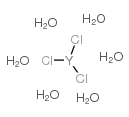氯化钇(III),六水合物, 99.9% metals basis,Yttrium chloride hexahydrate
产品编号:西域试剂-WR362375| CAS NO:10025-94-2| MDL NO:MFCD00149941| 分子式:YCl3·6H2O| 分子量:303.36
本网站销售的所有产品仅用于工业应用或者科学研究等非医疗目的,不可用于人类或动物的临床诊断或者治疗,非药用,非食用,
| 产品名称 | 氯化钇(III),六水合物, 99.9% metals basis |
|---|---|
| 英文名称 | Yttrium chloride hexahydrate |
| CAS编号 | 10025-94-2 |
| 产品熔点 | 100 °C (dec.)(lit.) |
| 产品沸点 | 100ºC at 760 mmHg |
| 产品密度 | 2.18 g/mL at 25 °C(lit.) |
| 精确质量 | 301.87600 |
| PSA | 55.38000 |
| LogP | 1.68270 |
| 外观性状 | 灰白色至灰色固体 |
| 蒸气压 | 24.5mmHg at 25°C |
| 稳定性 | 溶解度(g/100g H2O),217(20℃),235(50℃)。在HCl气流中加热脱掉六个水。 |
| 储存条件 | 2-8°C |
相关文档
化学品安全说明书(MSDS)
下载MSDS质检证书(COA)
相关产品
| 个人防护装备 | dust mask type N95 (US);Eyeshields;Gloves |
|---|---|
| 危害码 (欧洲) | Xi: Irritant; |
| 风险声明 (欧洲) | R36/37/38 |
| 安全声明 (欧洲) | S26-S36 |
| 危险品运输编码 | NONH for all modes of transport |
| WGK德国 | 3 |
| RTECS号 | ZG3160000 |
Synonym:None Section 2 - COMPOSITION, INFORMATION ON INGREDIENTS
Risk Phrases: None Listed. Section 3 - HAZARDS IDENTIFICATION EMERGENCY OVERVIEW
Not available. Potential Health Effects Eye: Causes severe eye irritation. Causes redness and pain. Skin: Causes mild skin irritation. Skin absorption not likely. Ingestion: May cause gastrointestinal irritation with nausea, vomiting and diarrhea. Inhalation: May cause respiratory tract irritation. Chronic: No information found. Section 4 - FIRST AID MEASURES Eyes: Flush eyes with plenty of water for at least 15 minutes, occasionally lifting the upper and lower eyelids. Get medical aid immediately. Skin: Flush skin with plenty of soap and water for at least 15 minutes while removing contaminated clothing and shoes. Get medical aid if irritation develops or persists. Wash clothing before reuse. Ingestion: Do NOT induce vomiting. If victim is conscious and alert, give 2-4 cupfuls of milk or water. Never give anything by mouth to an unconscious person. Get medical aid immediately. Inhalation: Remove from exposure to fresh air immediately. If not breathing, give artificial respiration. If breathing is difficult, give oxygen. Get medical aid if cough or other symptoms appear. Notes to Physician: Treat symptomatically and supportively. Antidote: None reported. Section 5 - FIRE FIGHTING MEASURES General Information: As in any fire, wear a self-contained breathing apparatus in pressure-demand, MSHA/NIOSH (approved or equivalent), and full protective gear. During a fire, irritating and highly toxic gases may be generated by thermal decomposition or combustion. Extinguishing Media: Use agent most appropriate to extinguish fire. Cool containers with flooding quantities of water until well after fire is out. Section 6 - ACCIDENTAL RELEASE MEASURES General Information: Use proper personal protective equipment as indicated in Section 8. Spills/Leaks: Vacuum or sweep up material and place into a suitable disposal container. Clean up spills immediately, observing precautions in the Protective Equipment section. Provide ventilation. Section 7 - HANDLING and STORAGE Handling: Wash thoroughly after handling. Wash hands before eating. Use with adequate ventilation. Avoid breathing dust, vapor, mist, or gas. Do not get on skin or in eyes. Avoid ingestion and inhalation. Storage: Keep container closed when not in use. Store in a cool, dry, well-ventilated area away from incompatible substances. Section 8 - EXPOSURE CONTROLS, PERSONAL PROTECTION Engineering Controls: Use adequate general or local exhaust ventilation to keep airborne concentrations below the permissible exposure limits. Personal Protective Equipment Eyes: Wear appropriate protective eyeglasses or chemical safety goggles as described by OSHA's eye and face protection regulations in 29 CFR 1910.133 or European Standard EN166. Skin: Wear appropriate protective gloves to prevent skin exposure. Clothing: Wear appropriate protective clothing to prevent skin exposure. Respirators: Follow the OSHA respirator regulations found in 29CFR 1910.134 or European Standard EN 149. Always use a NIOSH or European Standard EN 149 approved respirator when necessary. Section 9 - PHYSICAL AND CHEMICAL PROPERTIES Physical State: Crystalline Solid Appearance: white to pale yellow Odor: odorless pH: 4.5 - 5.8 Vapor Pressure: Not available. Viscosity: Not available. Boiling Point: Not available. Freezing/Melting Point: 100 deg C Autoignition Temperature: Not available. Flash Point: Not available. Explosion Limits, lower: N/A Explosion Limits, upper: N/A Decomposition Temperature: Solubility in water: soluble Specific Gravity/Density: 2.18 @ 32 F Molecular Formula: Cl3Y.nH2O Molecular Weight: 195.2649 Section 10 - STABILITY AND REACTIVITY Chemical Stability: Stable under normal temperatures and pressures. Conditions to Avoid: Incompatible materials, dust generation, exposure to moist air or water. Incompatibilities with Other Materials: Moisture, strong bases, strong acids, strong oxidizing agents. Hazardous Decomposition Products: Hydrogen chloride, irritating and toxic fumes and gases, chlorine. Hazardous Polymerization: Will not occur. Section 11 - TOXICOLOGICAL INFORMATION RTECS#: CAS# 10025-94-2: ZG3160000 LD50/LC50: Not available. Carcinogenicity: Yttrium Chloride Hydrate - Not listed by ACGIH, IARC, NIOSH, NTP, or OSHA. See actual entry in RTECS for complete information. Section 12 - ECOLOGICAL INFORMATION Other No information available. Section 13 - DISPOSAL CONSIDERATIONS Dispose of in a manner consistent with federal, state, and local regulations. Section 14 - TRANSPORT INFORMATION IATA No information available. IMO No information available. RID/ADR No information available. Section 15 - REGULATORY INFORMATION European/International Regulations European Labeling in Accordance with EC Directives Hazard Symbols: Not available. Risk Phrases: Safety Phrases: S 26 In case of contact with eyes, rinse immediately with plenty of water and seek medical advice. S 37/39 Wear suitable gloves and eye/face protection. WGK (Water Danger/Protection) CAS# 10025-94-2: No information available. United Kingdom Occupational Exposure Limits CAS# 10025-94-2: OES-United Kingdom, TWA (listed as ** undefined **): 1 mg/m3 TWA CAS# 10025-94-2: OES-United Kingdom, STEL (listed as ** undefined **): 3 mg/m3 STEL Canada None of the chemicals in this product are listed on the DSL/NDSL list. CAS# 10025-94-2 is not listed on Canada's Ingredient Disclosure List. Exposure Limits CAS# 10025-94-2 (listed as ** undefined **): OEL-AUSTRALIA:TWA 1 mg/m3 US FEDERAL TSCA CAS# 10025-94-2 is not listed on the TSCA inventory. It is for research and development use only. SECTION 16 - ADDITIONAL INFORMATION N/A |










 浙公网安备 33010802013016号
浙公网安备 33010802013016号